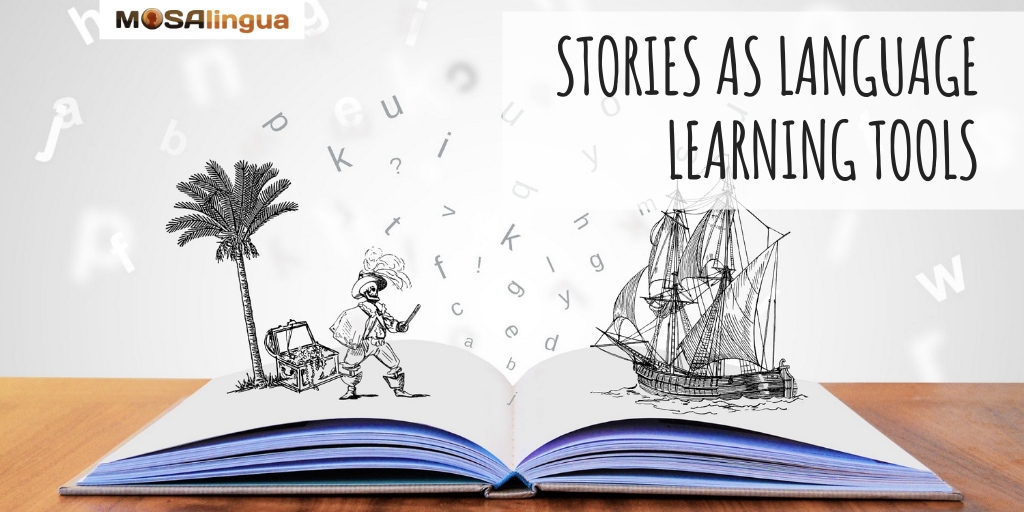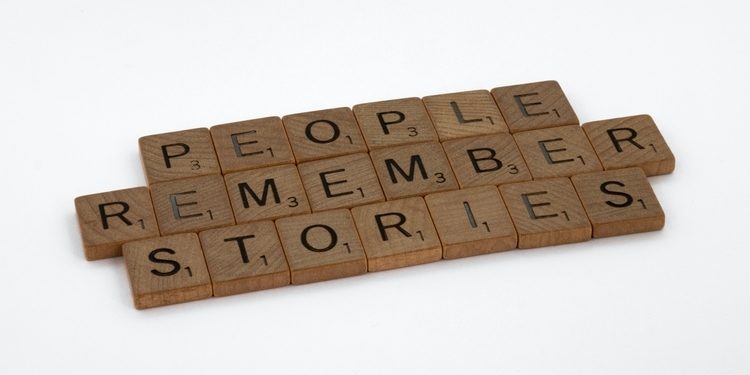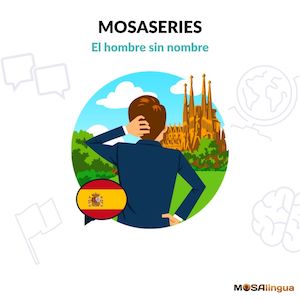If you could choose between going to class… Or plopping down on your couch to watch TV… 99% of us would pick the latter! That’s because we all love a good story. Stories have the power to transport us to other worlds, put us in other people’s shoes, and take us on adventures. If reading or listening to language-learning stories isn’t a part of your practice routine, you’re missing out! We’re delving into 5 aspects of stories that make them so incredibly effective at helping us learn languages.

If you’d rather go hands-free, you can listen to this article on the MosaLingua Language Lab podcast:
Listen to “#40 – Learn a Language With Stories” on Spreaker.
What’s inside…
Why Are Language-Learning Stories So Great for Learners?
Let’s clear one thing up right away. By “stories,” we don’t just mean fairy tales or even novels. Stories can take many different forms. Storytelling is about as old as language itself. Some of the first stories were cave drawings, created over 30,000 years ago. Today, stories can be told through media like comic books, or newspaper articles.
The art of oral storytelling is also a tradition that dates back many, many years. These days, it takes the form of movies, TV shows, and podcasts, for example. Even some video games tell stories!
1. Stories are an accessible and abundant learning resource
And this is the first point I want to make: stories are an accessible and abundant learning resource. There are stories in every language, and every genre. And you’re free to pick whatever format you enjoy most.
So if you’re a language learner, there’s a story out there for you. At the end of the article, we’ll tell you about one in particular that you’re going to love, especially if you’ve struggled to find stories that suit your learning needs in the past.
2. Good language-learning stories get us hooked and are entertaining
As a kid, I remember staying up until the wee hours of the night, way past my bedtime, under my blankets, with my flashlight and the latest Harry Potter book, because I literally couldn’t put it down. And I know I’m not the only one who has binged an entire TV series in just a day or two because I’ve gotten so sucked into the plot. Squid Game, anyone?
When you’re entertained, you’ll hardly realize you’re practicing. You’re more concerned about how the characters are going to get out of the predicament they’re in. Or whether those two who have insane chemistry will finally admit they love each other already!
TV series and other serial-type stories like comics, podcasts, and audio series, are especially great for learners because they keep you coming back every week. Consistency is incredibly important for language practice. Therefore, when you get hooked on a story that releases a new chapter or episode regularly, it’s a pretty good guarantee that you’ll stick with your language practice.
3. Consuming stories is already a habit for most of us
Reading, watching, or listening to stories is something you do already in your native language. So, it’s just a matter of tweaking these habits to include your target language. Adjusting an existing habit, like listening to a podcast on your morning commute or reading a chapter before bed, is easier than creating an entirely new habit. As you know, it takes about 30 days of consistent practice to make a new behavior stick.
Those are the more abstract benefits—motivating us and giving us the desire to practice, promoting consistency, etc. Now I want to talk about the more concrete ways in which they help us learn language.
4. Stories are a natural environment for absorbing vocabulary, grammar, and syntax
First, stories expose you to new vocabulary, grammar, and syntax in a natural way. They give you plenty of context to help you understand it, and repetition so that you can begin to remember it.
When you discover a new sentence structure or turn of phrase by yourself, you’re much more likely to retain it than if you had simply read about it in a grammar handbook. This intuitive process of picking up new syntax or looking for patterns in verb endings while you’re reading or listening, and then trying them out yourself, works your critical thinking skills and helps you remember them so much better.
The fact that they’re linked to characters and a plot that you probably care about, rather than isolated examples from a textbook that don’t mean anything to you, also reinforces your understanding.
5. They contain elements that help us memorize vocabulary
What are the “ingredients” you need to effectively memorize vocabulary? We’ve already talked about two of them that stories provide:
- context, which teaches us how a particular word can be used naturally and connects it to the words around it,
- and repetition/consistency. If you want to memorize a word for the long haul, you can’t just read or hear it once and expect to remember it. In stories, key words and phrases are repeated several times and in different situations. This helps you memorize them more quickly, though ideally you still need to supplement with another vocabulary memorization tool.
Stories also often incorporate four other memory techniques that reinforce the associations our brain makes when it stores, and later recalls, a new word:
- emotion,
- exaggeration,
- movement,
- and visualization, or mental images,
…which are all very powerful for effective memorization.
What storytelling devices double as memorization techniques?
One way that storytellers hook readers or listeners is with emotion. There’s usually at least one character you can identify and empathize with on an emotional level. Or else an emotional scenario that you yourself have gone through. Take the three bears, when they come home and realize that a bratty little girl, Goldilocks, has been rummaging through their things and eating their porridge! What do they feel? Outrage! Surprise!
Exaggeration can come in the form of a character’s overblown reaction to a situation, or to a character or location itself. Like the beanstalk in Jack and the Beanstalk. That thing stretched all the way up into the sky!
Stories are also dynamic. There’s a beginning, middle, and end, and there are events that advance the plot. For Hansel and Gretel, there’s movement when they “scatter” breadcrumbs along the trail. Again when the birds “nibble” up those breadcrumbs causing them to lose their way. And finally when they “push” the mean old witch into the oven.
And finally, visualization. Of course, images are built-in when we watch stories on TV or read comic books. But storytellers are great at helping us create our own mental images, too! Picturing the wolf from Little Red Riding Hood, ridiculously dressed up in granny’s clothes, with his hairy arms and legs sticking out, is a pretty effective mental image.!
🗣 MosaTip: Keep these techniques in mind when you come across a new word in a story that you want to remember. For more memorization tips, read these Tips on How to Memorize and Learn Difficult Information. And to learn about how to improve your memory in general, check out this article: How to Improve Your Memory with Lifestyle and Food Choices
Start learning a new language today

Good news: we can help!
More good news: you can get started for free! Start your free trial now and for the next 15 days, take advantage of the most effective language learning method on the market!
Vocabulary flashcards, videos with subtitles, audiobooks, articles adapted to your level – with MosaLingua Premium (Web & Mobile), you’ll have access to all this and more. Get started right now. It’s free—and risk-free—to try!
How Can Language-Learning Stories Be Even More Effective Tools?
Now you know the 5 main benefits of learning a language with stories.
Nonetheless, if you’re a beginner or low-intermediate learner, you may be facing a huge issue. Finding stories that are suitable for your level.
If you like to read stories, look for books and other texts written for language learners. Graded texts are often simplified versions of popular novels. You can find an A1-level (beginner) version of a Sherlock Holmes book or Dracula, for instance.
You’ll have a bigger problem if you want to use TV series, which are often just too difficult for beginners. It’s very hard to find good stories to watch and or listen to when you are starting to learn a language.
That’s why we created MosaSeries, an audio course based on a story.
Try MosaSeries for free
It incorporates new vocabulary and structures little by little and focuses on building up your listening comprehension skills. It’s easy at the beginning and it gradually becomes more and more difficult. That way, even beginners can experience the incredible power of stories for language learning.
And it’s not just a story, it’s also a complete language-learning method. It tells you exactly what to focus on, and guides you in such a way that you can learn the language of your choice and enjoy the thrill of the journey.
It has something for everyone—mystery, humor, and even some romance. 😉 The MosaLingua team spent over 2 years developing this story to be a stepping stone. Our goal is to help learners reach an intermediate level so they have access to even more stories.
It’s an awesome course, but don’t take our word for it. Kira, one of our MosaSeries French users, left us a testimonial about her experience. Listen to what she had to say.
Video: Why and How to Make Language-Learning Stories Part of Your Practice
Want more of my tips? Find all the info from this article in our YouTube video below, which you can also watch on our channel. It’s in English, but you can turn on subtitles or slow down the playback speed if you need to. Just click the gear icon (⚙️) at the bottom right of the player.
Subscribe to our YouTube channel for more language tips and tricks
Take It Further
Interested in using stories for learning? Delve deeper into this topic with a few more articles about the kinds of stories that are best for language learners:
- Make YouTube a Language Learning Playground [VIDEO]
- Improve Your Comprehension with Podcasts and Audiobooks
- Make the Most of Your Subscription – Learn English with Netflix [VIDEO]
- Top 10 Best Spanish Movies on Netflix
- How to Learn French with Netflix
- How Music and Learning Go Hand-in-Hand in Becoming Fluent
- 5 Video Games to Practice a Language With
I hope you’ll check out MosaSeries and experience first-hand all of the benefits of stories and storytelling that I just talked about! If you’re interested in learning more about the TPRS learning method we use in MosaSeries, check out this Language Lab episode:
Listen to “#65 – Learn Languages With Stories: the TPRS Method” on Spreaker.
In any case, I encourage you to use stories to improve your language skills. It’s fun, useful, and effective, so give it a try. And before you go, drop me a comment to let me know what stories you’re hooked on right now! Happy learning!







Comments